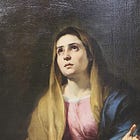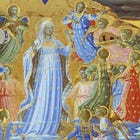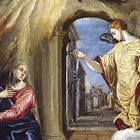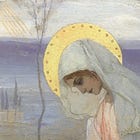The Church's debt to the Immaculate Heart of Mary
Although the Blessed Virgin Mary seems to be in the background in the New Testament narrative, her influence quietly pervades the events, which she ponders in her Immaculate Heart.
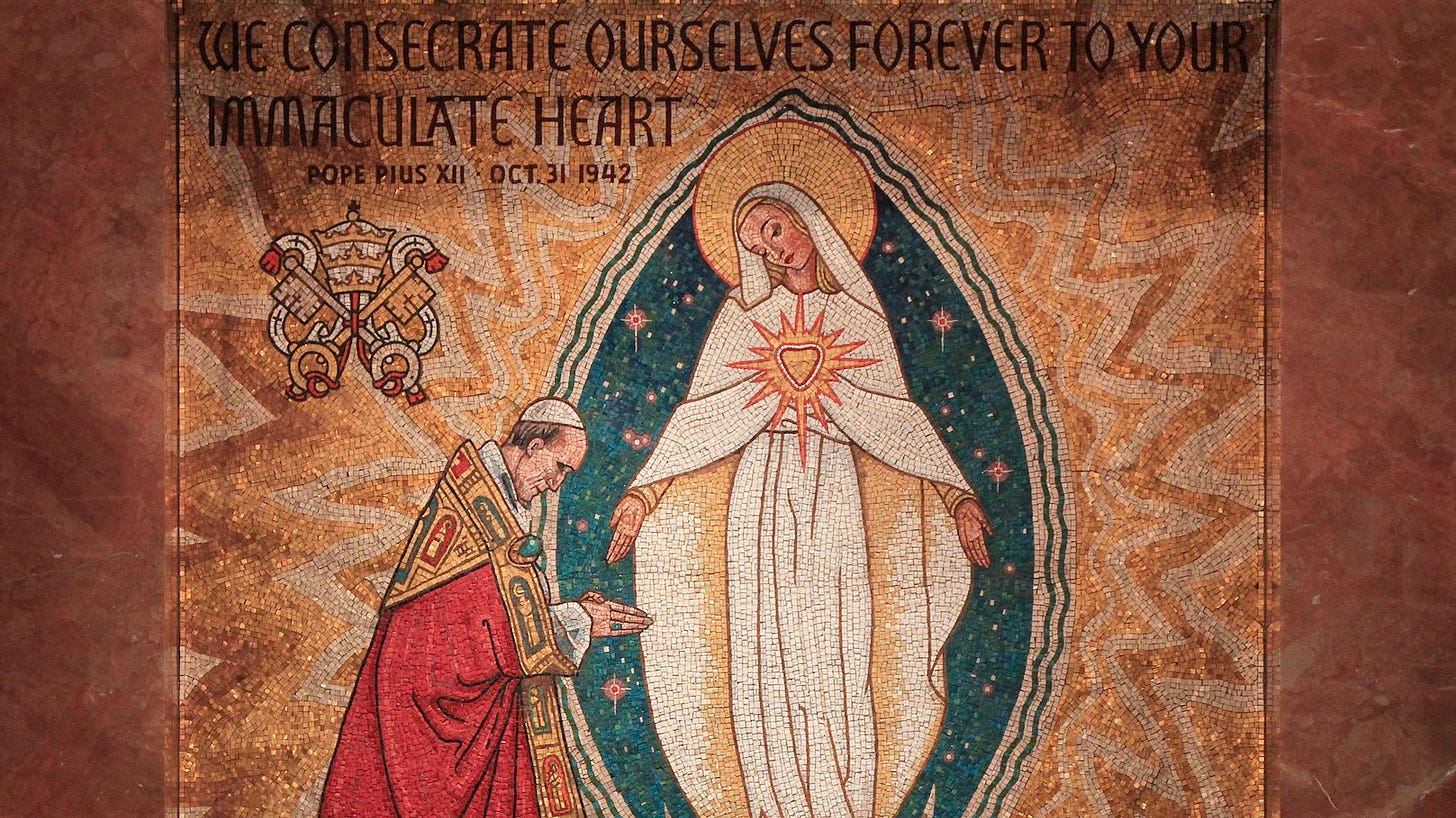
The Church's debt to the Immaculate Heart of Mary
From
Mother of the Church – Mary in the First Apostolic Age
Fr Henry James Coleridge, 1887, pp 312-5.
It is in the last Gospel, written by the disciple whom our Lord loved, and to whom He commended His Mother from the Cross, that we find, not so much fresh details which no one but our Blessed Lady could have communicated, as, in the first place, the breathing of a spirit of closeness with our Lord all through which is characteristic of her.
And in the second place, [we find] the two great mysteries, as they ought to be called, which especially reveal her power in the Kingdom of her Son, namely, the beginning of “signs” at her prayer at the marriage at Cana, and her presence by the side of the Cross while our Lord hung upon it till His Death.
It is on the second of these especially that our Lady’s great position as the Mother of the Church is founded.
She had long passed away from earth when St. John wrote his Gospel, and he had then seen the Apocalyptic vision of the woman clothed with the sun, and the moon under her feet, and on her head a crown of twelve stars.1
Mary is not mentioned in this Gospel except on these two occasions, the two mysteries which as it were connect the opening of the history with the end, while the sublime words and deeds with which the interval is filled up are just those connected with the great sacramental truths on which her heart loved to dwell.
The Passion and the Immaculate Heart
There is another subject, filling a very large space in each of the four Gospels, as to which it is quite certain that our Blessed Lady was the highest authority, and in the prominence of which in the narratives we may trace her guiding hand.
This subject is, of course, the Passion.
The only Apostle, besides St. Peter, who witnessed anything of what passed in the houses of Annas and Caiphas, must have been St. John. It is doubtful whether he witnessed what passed before Pilate and Herod, or the scourging and crowning with thorns, and all that followed.
But it is certain that our Blessed Lady was more familiar with the details of the Passion than anyone, that she either witnessed them herself or was aware of them by that special gift which enabled her to keep the Sacred Heart of our Lord company in all its sufferings, that she ever afterwards made them the continual subject of meditation and prayer, honouring each word and act and wound and insult of our Lord with a particular devotion, that in truth, the Passion was her constant and engrossing occupation, save that her remembrance of it did not prevent her from attending to the many calls which were made on her charity and her prudence.
We may therefore assume that, although we may not be able to trace her influence in particular points, still our debt to her in the history of the Passion is enormous.
And it may be added that it is likely that we owe to her faithful memory and habit of tender devotion the traditions concerning the Holy Places, the Way of the Captivity, the Way of the Cross, and others, as well as the beginning of the veneration of the relics of the Passion.
Our debt to Our Lady
In these and in a thousand other ways, the children of the Church of our Lord may see what is some part of their debt to His Blessed Mother, during the years when she was left on earth an exile from Heaven, for the sake of that Church which He loved so well.
She was the first to practise that life of retirement and prayer for the needs of the world, which is the great earthly support of the Kingdom of God, and which is now carried on in hundreds of cloister homes, the inmates of which delight above all things in counting themselves as her children.
She lighted up in the world’s worst days the glorious beacon of the Virgin life, the rays of which illuminate the whole of Christendom, and which has raised marriage to a higher level than it could have attained, if it had not had by its side this witness of something higher and more heavenly.
Her prayers and her counsels were of incalculable help to St. Peter, and the others of the Twelve, and they helped to bring to their side as a more fruitful labourer than any, the great Apostle of the Gentile world, the great trophy of the prayer of St. Stephen, who also was her beloved child.
Her motherly heart took in the whole flock of the converted heathen, as she had sung in her Magnificat of the promises to Abraham, that in his seed all the nations of the earth were to be blessed.
Wherever in the Old World or in the New there are children of the Church, there are the fruits of the motherly prayers of Mary for the application of the merits of her Son. The centuries which were yet to be, while she remained on earth, were in her heart, as the generations yet unborn are in her heart now.
She has had a share in securing to us, who live so long after her time, and many of whom have been born outside the pale of the Church, the blessings of the Apostolical teaching, and of the Catholic Unity, in which our souls have been kept or into which they have been guided. When we contemplate the Sacred Passion, when we read the words and actions of our Divine Lord, she has been before us in our devotion and our study, and the very words in which the incidents have come down to us may come almost immediately from her.
She was the first devout worshipper of the Crucifix, the first loving and reverential communicant, the first to assist piously at the offering of the Adorable Sacrifice, the first Adorer of the Blessed Sacrament.
And in that particular and special privilege which consists in bearing the cross of sorrow after our Lord, she kept Him company most faithfully while His life lasted, and, as we have seen, she had her own unique cross to bear for the sake of His children, which she took up with courage and self-renouncement so marvellous for the fifteen years about which our thoughts have been now engaged.
May she win us the grace to know the gift which God has given us in her, and to use this inestimable treasure as He would have us use it!
Further Reading
See also The WM Review’s Fr Henry James Coleridge SJ Archive
HELP KEEP THE WM REVIEW ONLINE!
As we expand The WM Review we would like to keep providing free articles for everyone.
Our work takes a lot of time and effort to produce. If you have benefitted from it please do consider supporting us financially.
A subscription from you helps ensure that we can keep writing and sharing free material for all. Plus, you will get access to our exclusive members-only material.
(We make our members-only material freely available clergy, priests and seminarians upon request. Please subscribe and reply to the email if this applies to you.)
Subscribe now to make sure you always receive our material. Thank you!
Follow on Twitter, YouTube and Telegram:
Apoc. xii. I




